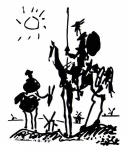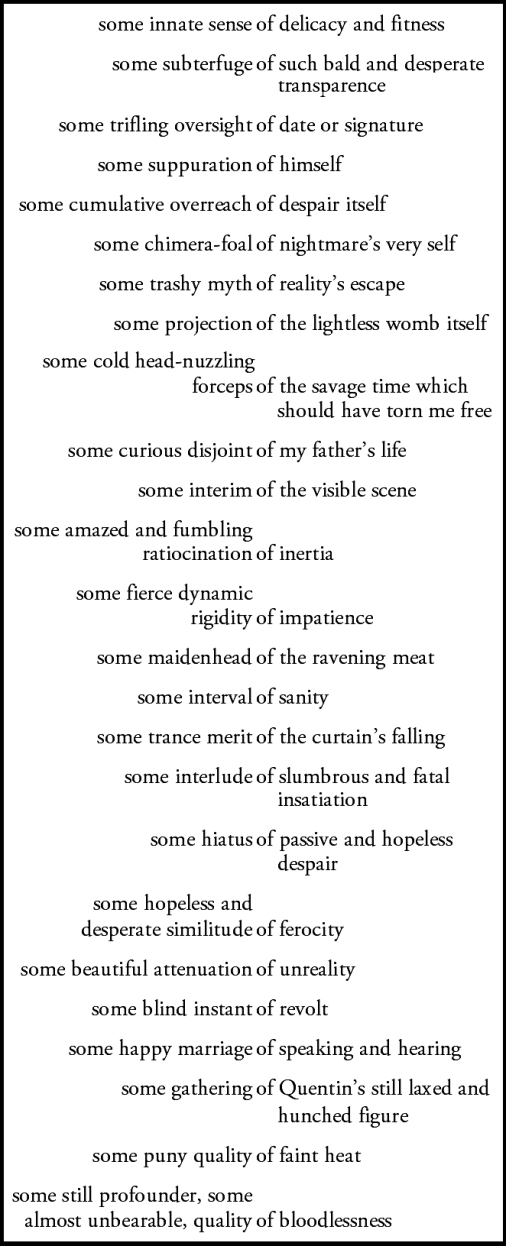 When I read, in Absalom, Absalom!, of “the regiment moving no faster than the wagon could, with starved gaunt men and gaunt spent horses knee deep in icy mud,” the image of Picasso’s famous Don Quixote sketch pops into my head. When I read, from a later chapter, “They faced one another on two gaunt horses, two men, young, not yet in the world, not yet breathed over long enough, to be old but with old eyes, with unkempt hair and faces gaunt and weathered,” I get the image of an editor on a lunch break.
When I read, in Absalom, Absalom!, of “the regiment moving no faster than the wagon could, with starved gaunt men and gaunt spent horses knee deep in icy mud,” the image of Picasso’s famous Don Quixote sketch pops into my head. When I read, from a later chapter, “They faced one another on two gaunt horses, two men, young, not yet in the world, not yet breathed over long enough, to be old but with old eyes, with unkempt hair and faces gaunt and weathered,” I get the image of an editor on a lunch break.
To say that the repetitive use of gaunt in these excerpts seems, in the first case, purposefully crafted for pleasing rhythmic effect and, in the second, an oversight is, certainly, de gustibus territory—but what can be argued is that the landscape of Absalom! feels populated to excess by skeletal figures such as these, both two-legged and four-.
Other equine examples include a “gaunt and jaded horse,” a “strange gaunt half-wild horse,” and a “gaunt black stallion.” Among their human counterparts are “gaunt and ragged men,” “a gaunt gangling man,” “a man with a big frame but gaunt now almost to emaciation,” and an old woman who manages to be “not thin now but gaunt” (that’s a good trick—presumably she was more of the pleasantly plump variety of gaunt?).
As would be expected, these lanky players have accordingly angular features: an architect with a “gaunt face, the eyes desperate and hopeless,” soldiers with “gaunt powder-blackened faces,” a student with a “gaunt tragic dramatic self-hypnotised youthful face like the”—makes sense, what with the tragic face—“tragedian in a college play.” One gentleman has a “gaunt worn unshaven face” while another’s face is “gaunt and ragged and unshaven.” (Nonfacial gaunt items include a “gaunt and barren household” and an anthropomorphized wagon that shares with its driver “that quality of gaunt and tireless driving.”)
Absalom!’s evil overlord Thomas Sutpen is himself the possessor of a “gaunt ruthless face,” and we are told that the aforementioned big-framed but gaunt man is also “ruthless and reposed”—neither of which description surprises much since Sutpen isn’t exactly on the receiving end of a lot of flattering characterizations in this book, and it is furthermore a novel with a generous helping of ruthlessness.
“[O]nly an artist”—this being the gaunt architect—“could have borne Sutpen’s ruthlessness.” “We talked of him, Thomas Sutpen…and when he would return…he would undoubtedly sweep us up with the old ruthlessness.” “They did not think of love in connection with Sutpen. They thought of ruthlessness.”
Sutpen—a.k.a. “the Sutpen with the ruthless Sutpen code,” wielder of “Thomas Sutpen’s ruthless will”—does not, however, have the market completely cornered in this area; other characters have “ruthless eyes,” display “ruthless pride,” command “ruthless tactical skill,” suffer “the ruthless agony of labor,” and offer—like the services of some kind of ninja nanny—“fierce ruthless constant guardianship.”
Rounding out the cast are “the ruthless and the strong,” those who are “generous but ruthless,” one man who acts with “cold and ruthless deliberation,” and another frosty fellow with a “character cold, implacable, and even ruthless.” Wherever that editor has been, I just hope lunch was good.
